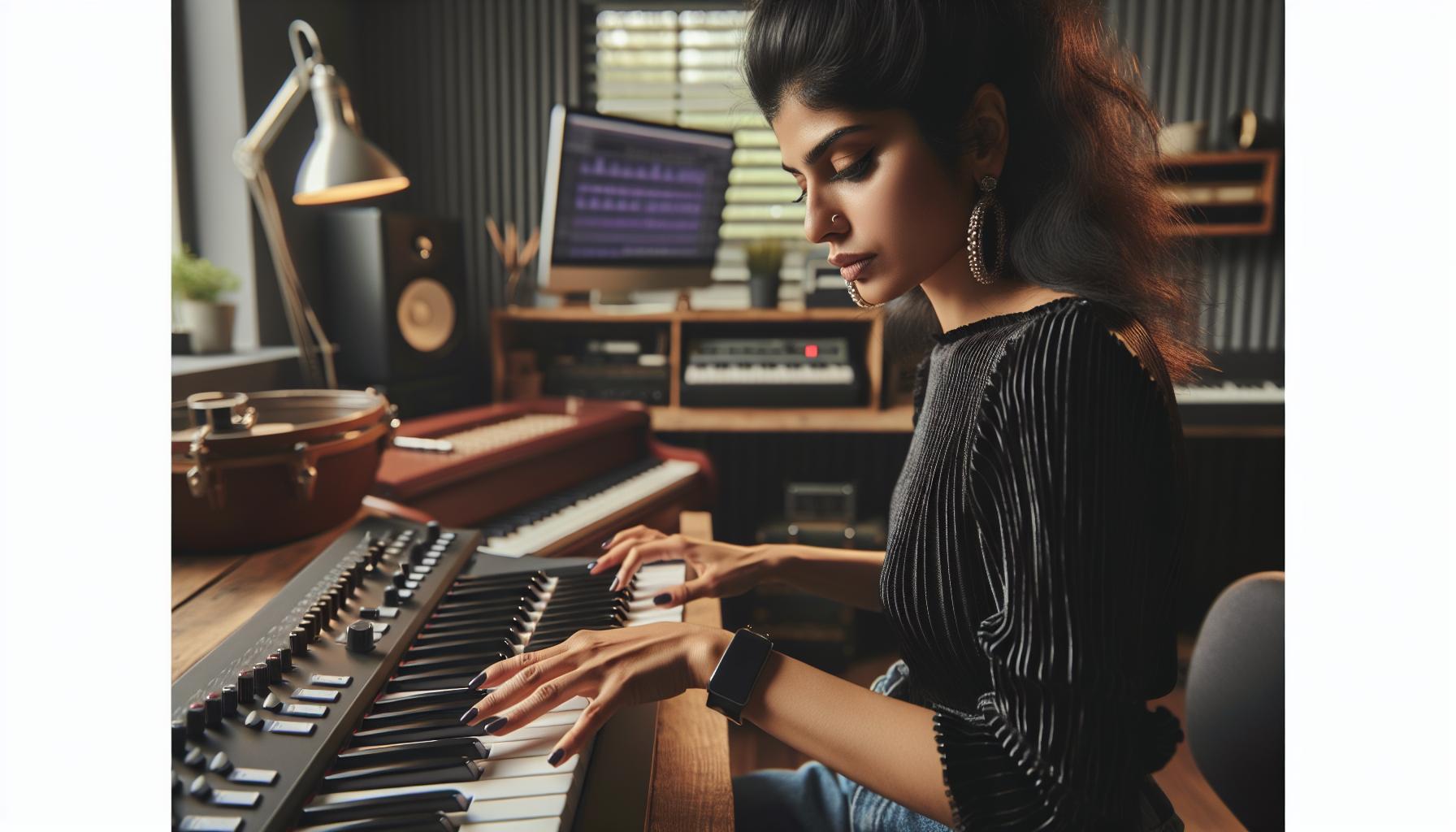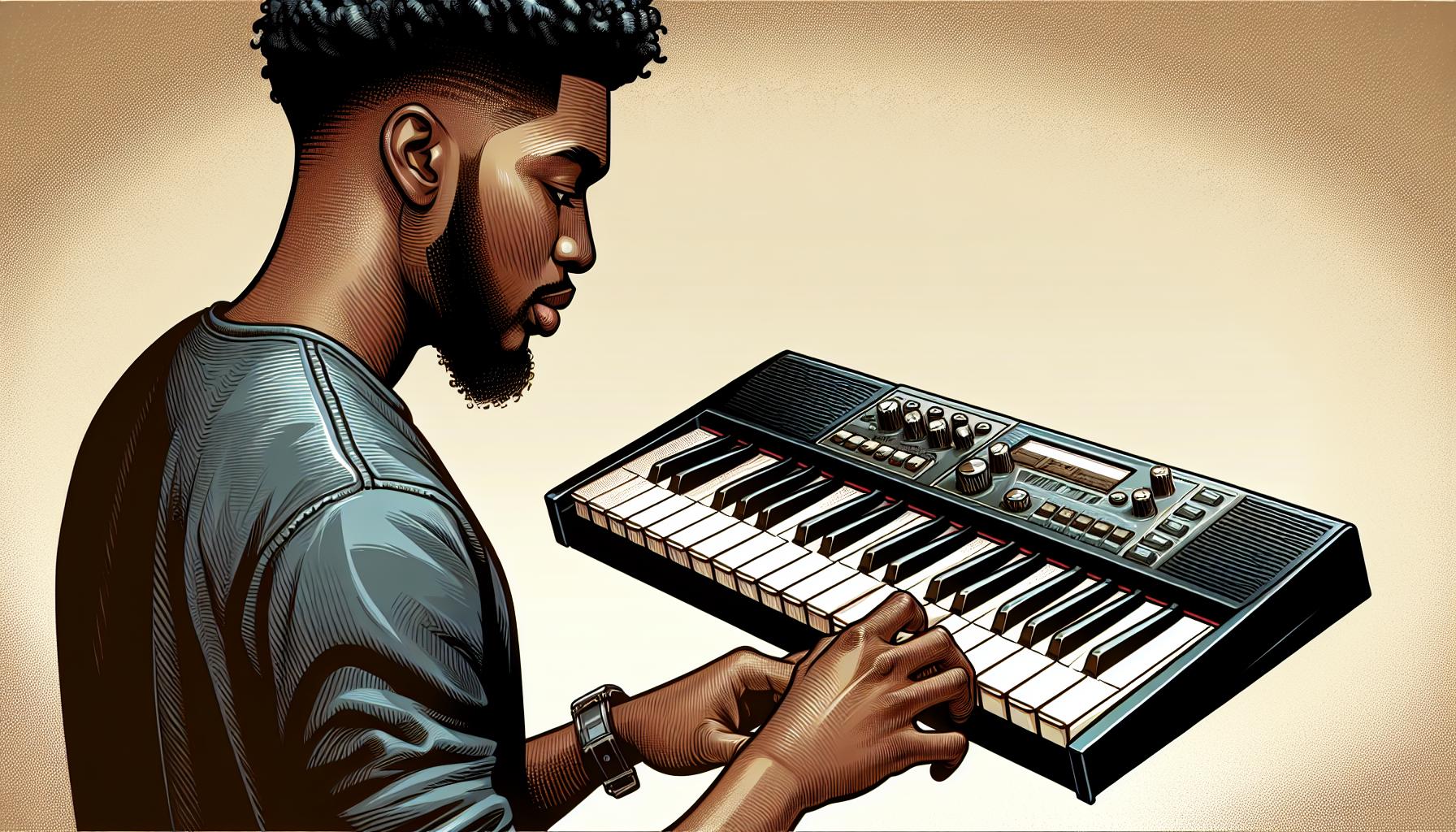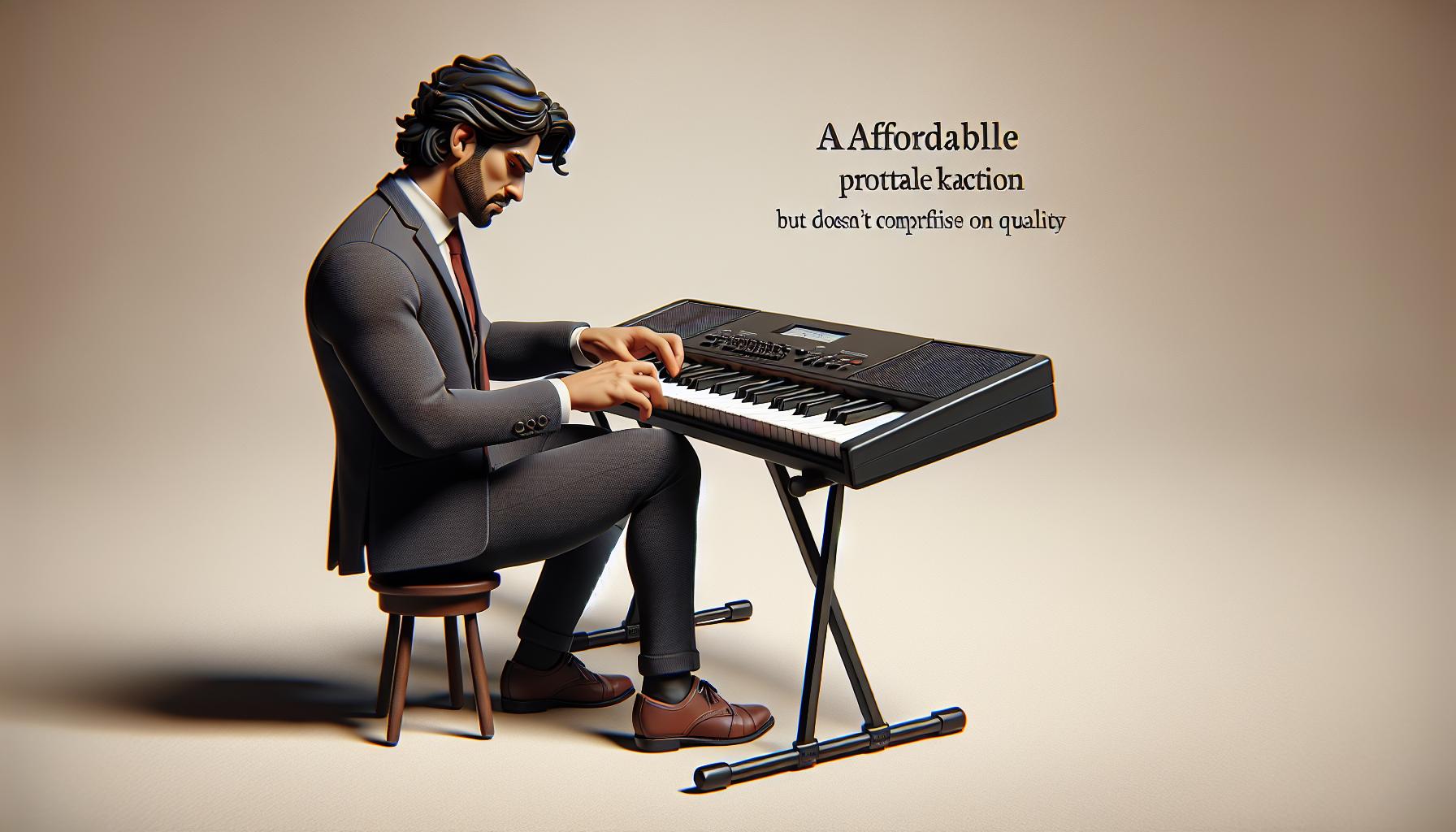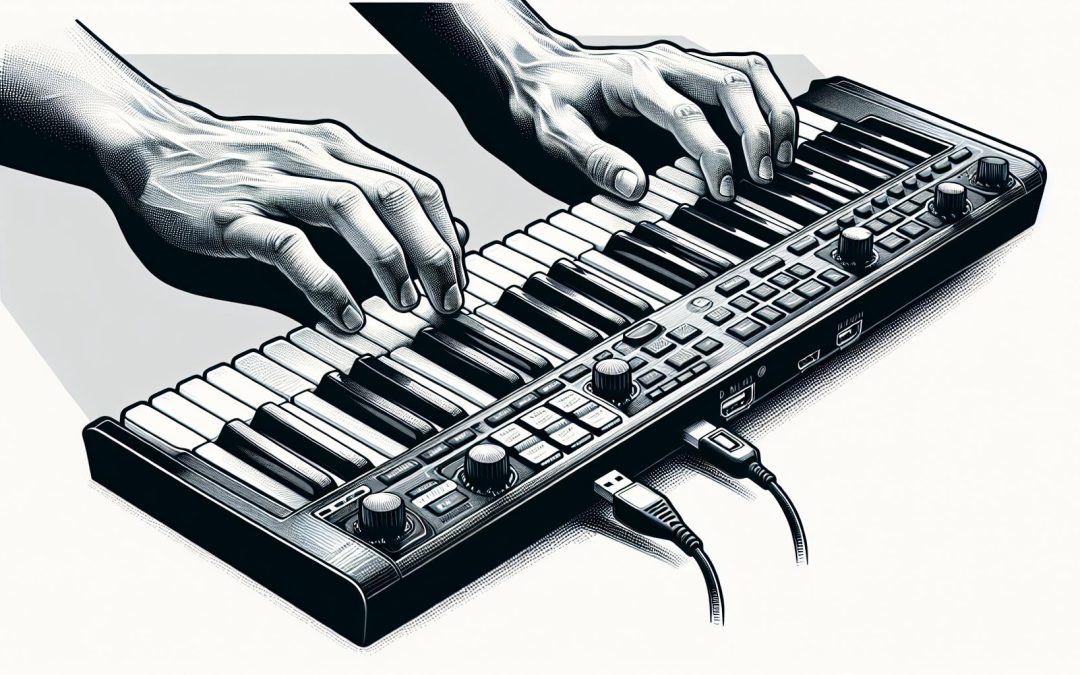Finding the perfect musical companion that doesn't break the bank can be a daunting task, especially for those in search of a portable keyboard that mimics the touch of an acoustic piano. Enter the world of affordable portable keyboards with weighted keys, a haven for both budding and seasoned pianists who yearn for that authentic feel without the hefty price tag.
These keyboards strike a harmonious balance between cost and quality, offering features that cater to both learning and performance needs. Whether you're practicing in a small apartment, performing at a local gig, or carrying your instrument from studio to studio, there's a keyboard out there that fits the bill perfectly.
So, if you're on the hunt for a musical partner that won't leave your wallet empty but still delivers on quality and performance, you're in the right place. Let's dive into the realm of affordable portable keyboards with weighted keys and discover how you can get your hands on the ideal one.
Understanding Weighted Keys in Keyboards
When embarking on the journey to find the perfect portable keyboard, it's essential to understand what sets weighted keys apart from their unweighted counterparts. Weighted keys are designed to mimic the resistance and touch of an acoustic piano's keys. This feature is critical for those aiming to develop or maintain proper finger technique and strength, as playing on weighted keys offers a tactile experience similar to that of a traditional piano.
Weighted keys come in various forms, including semi-weighted, hammer action, and graded hammer action. Each type offers a different level of resistance and tactile feedback, affecting the playing experience.
- Semi-weighted keys blend the spring-loaded action of unweighted keys with added resistance, making them an economical choice for beginners.
- Hammer action keys incorporate actual mechanical hammers, providing a level of realism that closely resembles an acoustic piano.
- Graded hammer action keys replicate the nuanced weight differences across an acoustic piano’s keyboard, with lower notes requiring slightly more force than higher ones.
Understanding these distinctions is paramount for selecting a keyboard that not only fits within a budget but also meets the individual needs of the player.
The benefits of playing on a keyboard with weighted keys extend beyond the tactile feedback. Research has shown that musicians who practice on weighted keyboards can improve their dynamic control and expressiveness, enhancing their overall performance quality. This is because the resistance of weighted keys allows for more nuanced control over volume and articulation, crucial skills for any pianist aiming to convey emotion through their music.
Moreover, transitioning from a keyboard to an acoustic piano becomes significantly easier with the experience of weighted keys. The similarity in touch and response facilitates a smooth transition, reducing the learning curve for players who aim to perform on both platforms.
Despite the advantages, the challenge lies in striking a balance between cost and quality. It's not uncommon to assume that a higher price tag equates to a better instrument. However, the market is teeming with affordable options that don't compromise on the feel and responsiveness of weighted keys. Manufacturers have managed to harness advanced technology to produce cost-effective models that deliver the desired tactile experience without the steep investment of an acoustic piano.
- The range of sounds and voices available
- Built-in metronomes and learning tools
- Connectivity options for computers and other devices
Benefits of Portable Keyboards for Musicians

Portable keyboards with weighted keys offer an array of advantages for musicians, whether they're beginners or seasoned professionals. In today's fast-paced world, the ability to take your music with you wherever you go is invaluable. These instruments combine the authentic feel of an acoustic piano with the flexibility and convenience of a portable design, making them an excellent choice for performers and composers alike.
One of the primary benefits of these keyboards is their accessibility. Unlike traditional pianos that are stationary and require significant space, portable keyboards can easily fit into a musician’s lifestyle, whether they're playing at home, in a studio, or performing live. This mobility ensures that practice or composition can happen anytime, anywhere, eliminating the constraints of location and allowing for spontaneous creativity.
In addition to their portability, these keyboards also offer an impressive range of features that can enhance a musician's versatility and creativity. Many models come equipped with a variety of sounds and tones, from grand pianos to orchestral instruments, enabling musicians to explore different genres and styles without the need for multiple instruments. Built-in metronomes, recorders, and learning tools further support a musician's development, making practice sessions more effective and enjoyable.
Another significant advantage is the cost-effectiveness of portable keyboards with weighted keys. They provide a cost-efficient alternative to acoustic pianos without compromising on the quality of the playing experience. Musicians can enjoy the nuanced touch and feel of weighted keys, crucial for dynamic control and expressiveness, without the hefty price tag and maintenance costs associated with traditional pianos.
Moreover, these keyboards are durable and low-maintenance, designed to withstand the rigors of travel and frequent use. This durability ensures that musicians can rely on their instruments to perform consistently, regardless of where their music takes them.
For those looking to bridge the gap between traditional pianos and digital convenience, portable keyboards with weighted keys are a smart investment. They offer a balance of practicality and performance that can accommodate the needs of a wide range of musicians.
Given these benefits, it's clear why portable keyboards with weighted keys are becoming increasingly popular among musicians. They embody the ideal blend of tradition and innovation, providing a versatile tool that supports the creative process and adapts to the dynamic lifestyle of modern performers. Whether you're a beginner looking to develop your skills or a professional seeking a reliable and expressive instrument, these keyboards offer something for everyone.
Features to Look for in an Affordable Portable Keyboard

When shopping for an affordable portable keyboard with weighted keys, several features stand out as must-haves for musicians. Weighted keys top the list, providing a more realistic touch and playing experience akin to an acoustic piano. This feature is crucial for those who aim to transition between digital and traditional pianos seamlessly.
Beyond the touch, polyphony is a term that frequently pops up. It refers to the number of individual notes a keyboard can produce at once. For beginners, a 32-note polyphony may suffice, but advanced players might look for 64-note or even 128-note polyphony to ensure complex pieces of music are delivered with clarity and without note drop-outs.
Sound quality is non-negotiable. The richness and authenticity of the sound can greatly influence a musician's performance and enjoyment. Affordable portable keyboards now often include multiple sound options, ranging from various piano tones to orchestral and synthesizer sounds, offering a palette for creativity.
Connectivity options add to a keyboard's versatility. USB/MIDI connections allow musicians to connect to computers and recording equipment, turning their keyboard into a powerful tool for composition and production. An auxiliary input for playing along with music from a phone or MP3 player is a boon for practice sessions, making learning both fun and effective.
Here's a quick rundown of the essential features to look for:
- Weighted Keys: For a realistic playing experience.
- Polyphony: Higher numbers ensure more complex pieces are heard clearly.
- Sound Quality: Look for a rich, authentic sound and a variety of tones.
- Connectivity: USB/MIDI ports and auxiliary input for versatility.
Lastly, the inclusion of built-in lessons and a metronome can be incredibly beneficial for beginners. These tools support learning and improve timing, respectively, providing a solid foundation for musical education. Some keyboards even offer interactive learning with apps and software, which can be particularly engaging for young learners.
Durability and portability also merit consideration. Musicians on the move should look for sturdy yet lightweight designs that can withstand the rigors of travel without adding too much to the load. A compact size that doesn't sacrifice octaves is ideal for those with limited space at home or in a studio.
Top Affordable Portable Keyboards with Weighted Keys

When diving into the world of music, finding a portable keyboard that's both affordable and equipped with weighted keys can seem daunting. Yet, many manufacturers have risen to the challenge, offering instruments that don't skimp on quality for price. For aspiring musicians and seasoned professionals alike, these keyboards strike the perfect balance between portability, functionality, and affordability.
First on the list is the Casio CDP-S150. Renowned for its realistic feel reminiscent of an acoustic piano, this model boasts 88 fully weighted keys and a slim, sleek design that makes it ideal for musicians on the move. Despite its compact size, it doesn't compromise on sound quality, featuring Casio’s proprietary sound source, ensuring that each note played is both clear and dynamic.
Next, the Yamaha P-45 stands out not only for its authenticity in touch but also for its Advanced Wave Memory (AWM) sampling, which captures the essence of acoustic piano sounds. This technology, combined with its 64-note polyphony, allows for the playing of complex pieces without note drop-out. What’s more, its simplicity and ease of use make it a top pick for beginners and professionals seeking a straightforward, high-quality instrument.
Another noteworthy contender is the Alesis Recital Pro. Offering 88 hammer-action keys, this keyboard goes above and beyond to provide a responsive playing experience. With 12 built-in voices and the ability to split or layer sounds, versatility is at the fingertips of its users. Additionally, features such as the built-in metronome, recording capability, and educational modes support learners at every stage of their musical journey.
For those prioritizing connectivity, the Roland FP-10 emerges as a leading option. Alongside its PHA-4 Standard Keyboard, which guarantees the most authentic feel, this model is equipped with Bluetooth MIDI and USB connectivity, allowing for easy integration with educational and recording software. Its compact and lightweight design, combined with unrivaled sound projection technologies, makes it a top choice for performers and composers looking to blend quality with convenience.
To give a clearer picture of these offerings, here's a quick rundown:
| Keyboard Model | Key Features | Polyphony | Connectivity |
|---|---|---|---|
| Casio CDP-S150 | 88 Weighted Keys, Slim Design, Sound Source | 64 |
Tips for Choosing the Right Keyboard for Your Needs

When diving into the world of music through the keys of a portable keyboard, it's crucial to find an instrument that not only fits your budget but also ticks all the boxes for your specific needs. Here are some valuable insights to guide you in your search for the perfect portable keyboard with weighted keys.
Consider Your Skill Level
First, assess your skill level. Are you a beginner looking to learn the basics, or are you an experienced player in need of advanced features? Beginners might find keyboards like the Alesis Recital Pro appealing due to their user-friendly interfaces and learning tools. In contrast, more experienced musicians could lean towards models like the Yamaha P-45 or Roland FP-10, which offer intricate features and superior sound quality essential for detailed compositions and performances.
Evaluate the Key Action
The essence of a weighted keyboard is its ability to mimic the touch, feel, and response of an acoustic piano. There are varying degrees of weighted action:
- Semi-weighted keys provide a lighter touch, suitable for beginners.
- Hammer action keys replicate the mechanism of an acoustic piano more closely, preferred by intermediate to advanced players.
It's vital to choose a keyboard that provides a comfortable playing experience, facilitating growth and skill improvement over time.
Polyphony Counts
Polyphony refers to the number of individual notes a keyboard can produce at one time. For learners and hobbyists, a polyphony of 32 to 64 notes is generally sufficient. However, for advanced players and those interested in layering sounds or complex compositions, looking for keyboards with a polyphony of 128 notes or more is advisable. Higher polyphony enhances the richness and depth of the music, allowing for more expressive performances.
| Skill Level | Recommended Polyphony |
|---|---|
| Beginner | 32-64 |
| Intermediate | 64-128 |
| Advanced | 128+ |
Connectivity Matters
In today's digital age, the ability to connect your keyboard to a computer or mobile device opens up a world of opportunities for music production and learning. Look for keyboards that offer USB or MIDI connectivity, as well as Bluetooth capabilities for wireless connections. Models like the Roland FP-10 shine in this area, offering seamless integration with music software and apps.
Conclusion
Choosing the right portable keyboard with weighted keys boils down to understanding one's own musical journey and the features that best support it. Whether it's a beginner seeking simplicity and ease of use or an experienced musician in search of rich sound and intricate features, there's a keyboard out there that fits the bill. Remember, the key action, polyphony, and connectivity options play crucial roles in bringing your music to life. So, take a moment to reflect on what you really need from your instrument. After all, the perfect keyboard isn't just about the specs—it's about how it makes you feel when you play.
Harlan Kilstein began playing piano during covid with no piano background at all. He taught himself how to play learning what to do and what not to do.
Today he's an advanced intermediate player and can help you grow in your skills because he learned all this on his own.








